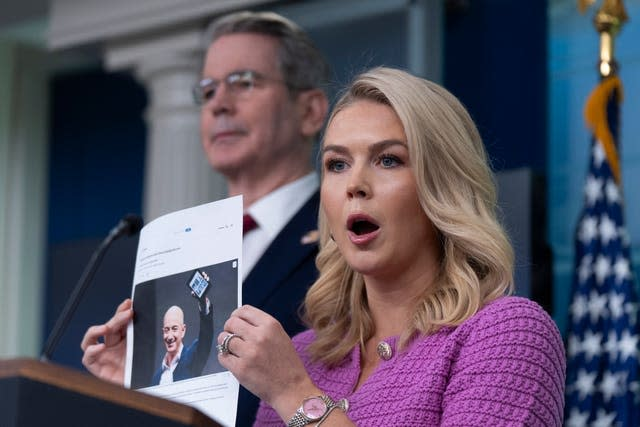Amazon is at the center of a heated political debate after news broke of a new feature the company was reportedly considering adding to its checkout process. According to a Tuesday morning report from Punchbowl News, Amazon planned to display how much consumers are paying in additional costs due to President Donald Trump‘s tariffs on certain imported goods. However, the proposed feature sparked immediate backlash from the White House, with Press Secretary Karoline Leavitt calling the move a “hostile and political act” aimed directly at the Trump Administration.
What’s All the Fuss About?
The feature in question would have listed a separate line item on Amazon checkouts, clearly showing how much more customers were paying due to tariffs imposed during the Trump Administration’s trade war with China. The suggestion immediately attracted attention and criticism from White House officials, with Leavitt questioning why Amazon had not implemented a similar feature during former President Joe Biden’s term to account for inflation.
“This is a clear example of Amazon using their platform to push a political agenda,” Leavitt said during a Tuesday morning press briefing. “Why didn’t they highlight inflation during the Biden years?”
Amazon’s Response: A Denial and Clarification
However, the controversy took a turn when Amazon quickly issued a statement refuting the Punchbowl News report. The company clarified that there had been no plan to implement the tariff transparency feature on its main site.
In a statement to The Washington Post, an Amazon spokesperson explained, “The team that runs our ultra-low-cost Amazon Haul store considered listing import charges on certain products. This was never a consideration for the main Amazon site, and nothing has been implemented on any Amazon properties.”
Despite Amazon’s denial, the damage had already been done. The discussion over the potential feature has only amplified tensions between the tech giant and the U.S. government.
The Political Fallout: Leavitt’s Strong Response
Karoline Leavitt, standing alongside Treasury Secretary Scott Bessent at the briefing, did not hold back in her response to the proposed Amazon feature. She described it as “political,” accusing the company of engaging in actions that could undermine the Trump Administration’s economic legacy.
To underscore her point, Leavitt even produced a printed article from Reuters during the briefing. The article, dated 2021, highlighted Amazon’s alleged partnership with China’s propaganda arm. While Leavitt implied the partnership was ongoing, the report’s actual date raised questions about the relevance and accuracy of the information in the current political climate.
Despite the White House’s criticism, it remains unclear if Amazon still has any ties to the Chinese government.
The Bigger Picture: Tariffs, Inflation, and Economic Policy
The timing of this debate is particularly significant as it coincides with growing concerns about inflation and the long-term economic effects of tariffs on American consumers and businesses. Leavitt and Bessent also emphasized the broader impact of the tariffs on global trade, suggesting that the Chinese economy could lose millions of jobs as a result of the U.S. policies.
“China could lose up to 10 million jobs due to these tariffs,” Bessent argued. “This will make them realize that their tariffs are unsustainable.”
The debate surrounding Amazon’s potential move highlights the ongoing political divide over tariffs, trade policies, and the role of big tech companies in shaping public opinion and economic policy.
Jeff Bezos: A Figure of Controversy
One of the more contentious aspects of this debate is the involvement of Jeff Bezos, Amazon’s founder and owner of The Washington Post. Although Leavitt declined to comment on whether Bezos still supports President Trump, the connection between Bezos’ media ownership and the political discourse surrounding Amazon is hard to ignore.
Bezos, often seen as a progressive figure in the tech world, has found himself at odds with conservative figures, especially during the Trump era. The latest Amazon controversy adds fuel to the fire, further complicating the already volatile relationship between tech moguls and political leaders.
Americans Encouraged to Buy Local
In her remarks, Leavitt also urged Americans to support American-made products to strengthen the domestic supply chain and reduce dependence on foreign imports. “If we want to secure our future, we need to invest in American products and American labor,” she said.
While Leavitt’s comments about buying American products resonate with many, critics argue that the broader economic landscape, marked by rising costs and supply chain disruptions, makes it difficult for consumers to avoid foreign imports altogether.
The Potential Impact of the Amazon Tariff Transparency Feature
While the exact scope of the proposed Amazon feature remains unclear, the potential economic and political ramifications are significant. If the company were to move forward with such a plan, it could place an additional spotlight on the role that tariffs play in consumer pricing, making it a recurring topic of conversation in the public and political spheres.
The backlash from the White House may serve as a warning to other companies about the possible political fallout from making such bold, politically charged decisions. However, given Amazon’s massive global presence and influence, it seems unlikely that a mere political critique will slow down the company’s ongoing efforts to innovate and improve its customer experience.
The Bottom Line
Amazon’s proposed tariff transparency feature has quickly become a flashpoint in the ongoing debate about trade policy, big tech influence, and the intersection of business and politics. Whether the company moves forward with this feature or not, one thing is clear: the role of tech companies in shaping economic and political discourse will continue to be a hotly debated topic in the months and years to come.
Key Takeaways:
- Amazon’s potential tariff transparency feature sparked political backlash from the White House.
- Press Secretary Karoline Leavitt criticized the feature as a “hostile and political act” aimed at the Trump Administration.
- Amazon denied the report, clarifying that the feature was never considered for its main website.
- The debate touches on broader economic issues, including tariffs, inflation, and the role of tech giants in shaping public opinion.








